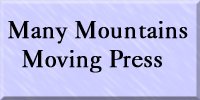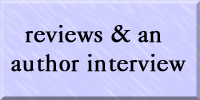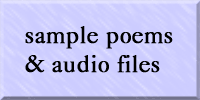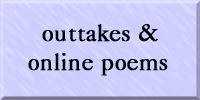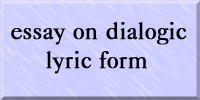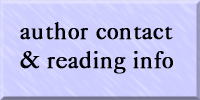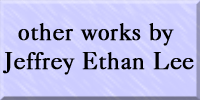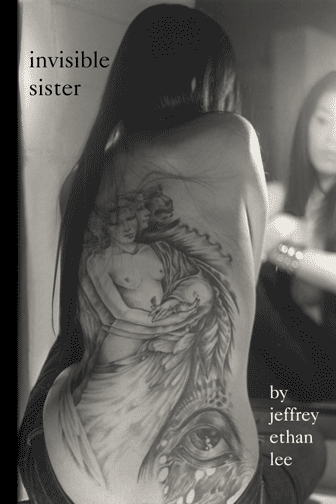“In
these poems Jeffrey Ethan Lee comes to hold and know the whole
fragile, euphoric world. “I could've been anyone,” he
writes, and with gorgeous, insistent and astonishingly musical
lines, he moves in and out of selves and what is to be apprehended.
This is no sotto voce debut, but a full-voiced one.”
—A.V.
Christie, National Poetry Series Winner
“[T]he long poem “invisible
sister”...is the heart of the work, and while it is challenging
in its complexity, it will reward any reader who has ever struggled
for communion with another person.”
—Thaddeus Rutkowski for
Small Press Review & Gathering of the Tribes
|
“Jeffrey Lee creates
a new way of reading in invisible sister, but more importantly
a new way for the reader to see the book as performance space:
to be orated, sung, swilled; more than this invisible sister teaches
the reader how to hear and experience its special and peculiar
music. The joy of the invisible is the tell-tale footprint, the
door moving slightly ajar—this is a special and unique book
that opens new space in the page for perception and then for the
further deepening of that same space. The voice makes a sound because
a stringed instrument in the body vibrates. The margins of this
book vibrate—the absent center is the sound.”
—Kazim Ali, the New England/NY Poetry
Prize Winner, Alice James Books |
|
"...the title poem [is] a tour de force of
persona and plot as a brother watches his sister careen out of control.
“invisible sister” does indeed set up a dialogue of
great tension—its sprawling formal voices and the dual (and
dueling) columns challenge the notion of Asians as an “invisible”
minority. Iris, the invisible sister, serves not only as witness
to her own experience but becomes a sort of every-girl when she
is coaxed into a barn by her white friend....
Jeffrey Ethan Lee has done a great service to performance
poetry. His careful line breaks, as well as his deft use of white
space and text, suggest a deliberate and thoughtful architecture
that belies a common complaint that so much of performance poetry
does not hold up on the page.
[T]here is much to be admired
in all of Jeffrey Ethan Lee’s poetic personas and voices...."
—Denise Duhamel for American Book Review
|
Invisible Sister,
Jeffrey Ethan Lee's first full-length collection of poems, is a
daring act of language that delivers with grace the self inescapably
splintered by language. In the book's prologue, Lee names some of
the things that betrayed him, such as "whiteness," "pretty
blonde," "beautiful doll"—terms
of race and gender that indelibly constructed and confined the self:
"I could've been anyone / if only the cells of the self / would've
let me out." This fragmented self ("all the hiding selves
who seek") takes the reader through the book's core, a long
poem broken into chapters from the life of Iris, the "invisible
sister" of the title.
Iris, named for the eye's light regulator; for the rainbow and
its goddess; for the plant of sword-shaped leaves and variously
colored flowers. No wonder, then, that eyes, rainbow, sky, sun,
light, shadow, and leaves are among the words and images that reverberate
throughout Invisible Sister. Also echoing throughout are words of
color, weather, phase, and extension: white, blue, rain, snow, ice,
flame, roots, limbs, branches, lines. Fragments of lines unfold
a story told in two voices (his and hers), the overlapping of which
conveys this certainty: Iris' being heard is key to her visibility,
to the whole self's seeing the multicolor truth.
—Marj Hahne for RainTaxi Review
of Books
|
